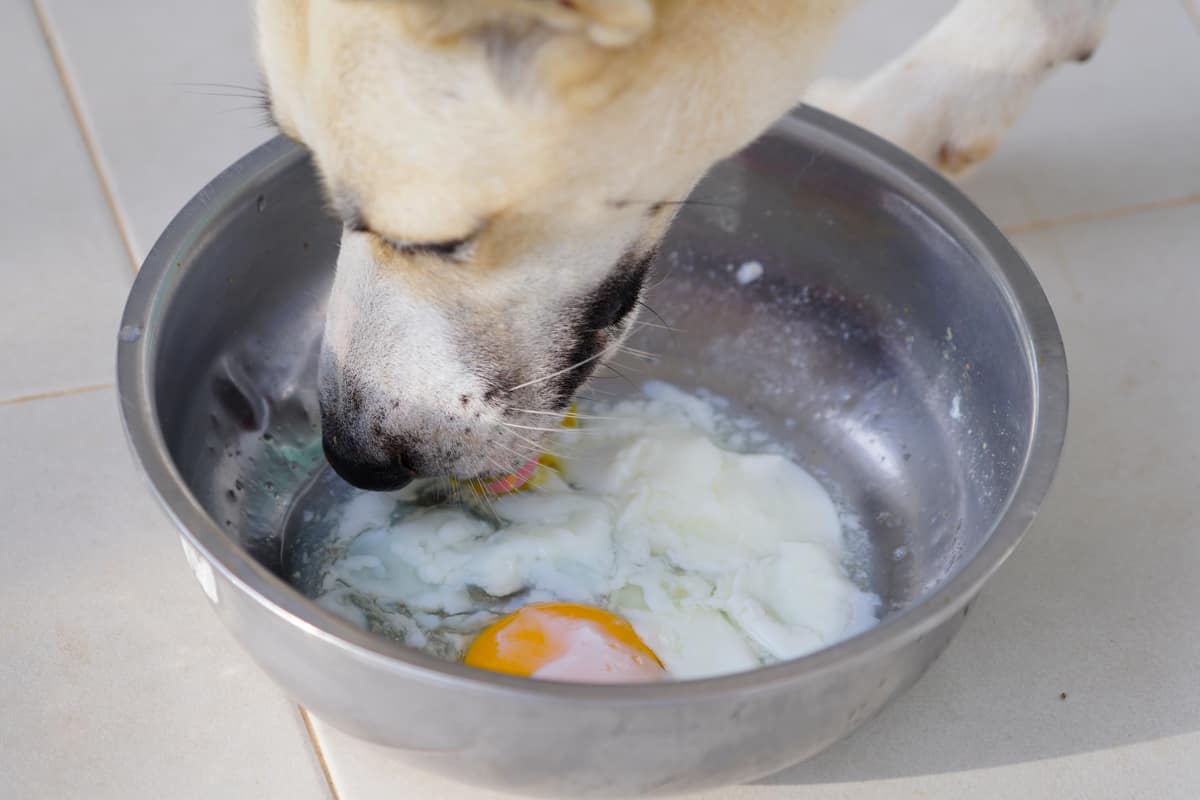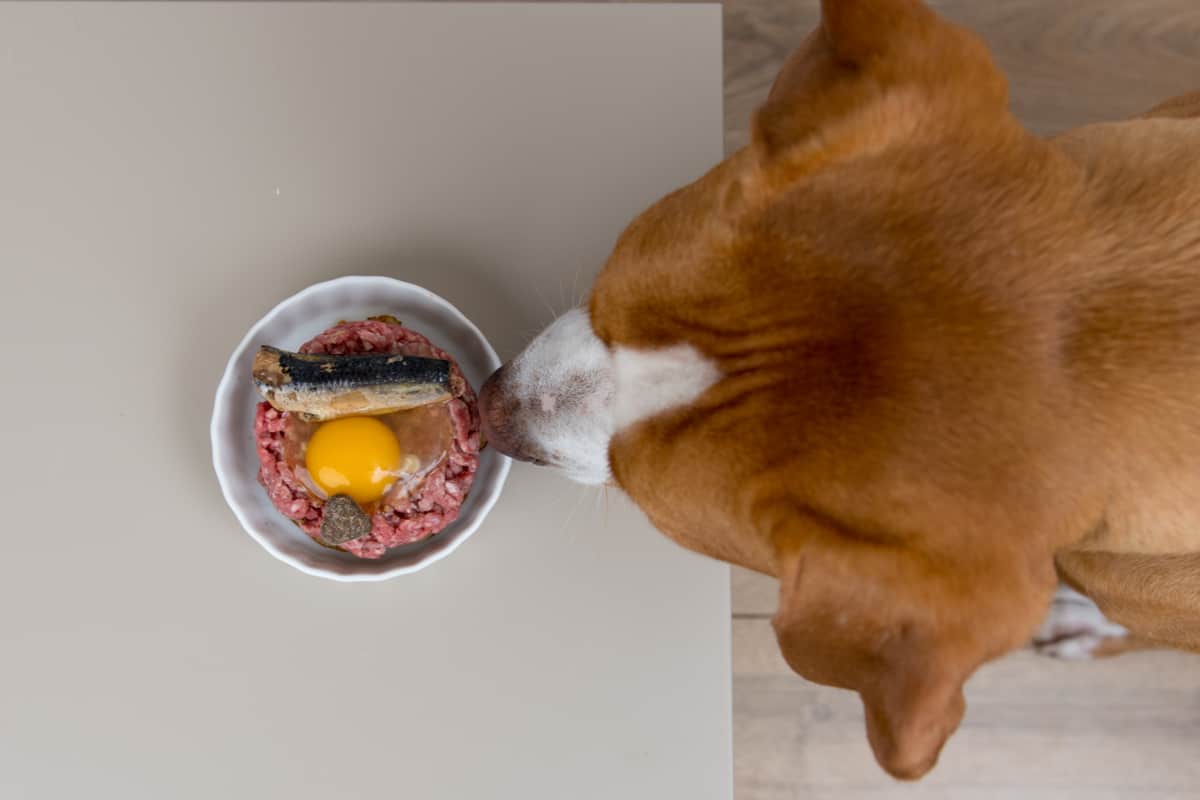Can Dogs Eat Scrambled Eggs?
The dog is an omnivorous species and can eat a wide variety of foods. The main difference between the diets of wild dogs and domestic dogs is that domesticated dogs are fed on a diet that includes animal products such as meat, milk, and eggs.
This allows them to grow bigger than their wild counterparts. However, this also means that they have become less selective in what they eat, and will often eat anything that is put into their mouth.
They may even be able to digest plant material, though it has not been proven yet. In addition, because of the availability of food, many domestic dogs live longer lives than their wild cousins.
The egg is a popular food for many animals, including humans. Eggs are nutritious and delicious. They contain protein, fat, carbohydrates, vitamins, minerals, and other nutrients that can help your dog stay healthy.
However, some foods should not be fed to dogs because they may cause health problems or even death. This article will tell you what foods you should avoid feeding your dog, including eggs.
Is It Safe For Dogs To Eat Scrambled Eggs?
The answer is yes, but only if the dog has a healthy digestive system and no allergies or other health issues that would make them ill from eating the egg yolk.
The egg white contains protein, vitamins, and minerals that are beneficial for your dog’s overall health. Dogs can digest eggs just like we do.
They have the same enzymes in their stomachs as us humans, so they can break down the proteins found in an egg into amino acids which then get absorbed by the body.
Eggs contain high levels of vitamin D3 (D2) and B12. Vitamin D helps regulate calcium metabolism and blood clotting, while B12 aids in energy production and nerve function.
Eggs also contain choline, which is important for brain development. Choline is found naturally in many foods such as liver, fish, meat, poultry, soybeans, wheat germ, and milk.
Egg yolks contain cholesterol, however, this is not harmful to dogs in low quantities. It is good for them because it is necessary for building strong bones and muscles.
Many people think that eggs are bad for dogs because they contain cholesterol. However, there is no evidence that eggs cause heart disease in dogs.
Research shows that diets containing up to 5% added egg protein may help reduce the risk of developing heart disease in dogs. That being said, you shouldn’t overfeed your dog eggs.
It is essential to note that raw eggs can be dangerous for dogs. This is because some breeds of dogs, especially those with long snouts, can easily swallow large amounts of raw eggs whole.
Raw eggs can also pose a choking hazard due to their size and shape. Additionally, raw eggs can be dangerous because they contain bacteria that can cause illness. If you suspect that your dog has swallowed a raw egg, contact your veterinarian immediately.
Can Dogs Eat Eggs Generally?

Yes! There are several reasons why dogs should be able to enjoy eggs. First, dogs need to consume enough dietary fat to support the proper growth and maintenance of lean muscle mass.
Egg yolks provide about 20-25% of the total calories per egg. Therefore, one egg provides approximately half of the daily requirement of essential fatty acids needed for optimal growth and development. Second, eggs are a source of quality protein.
Dogs need protein to build muscle tissue, maintain bone density and repair damaged tissues. Third, eggs are rich in nutrients including:
- Vitamin A – helps protect against infection, supports immune response, promotes vision and skin health, and helps prevent cancer. This nutrient is present in both egg whites and yolks.
- Vitamin D3 – Helps maintain normal calcium balance and promote healthy bones and teeth. This nutrient is present mostly in the egg yolk.
- Choline – Important for brain development and nervous system function. This nutrient is present mainly in the egg yolk, but small amounts are also present in the egg white.
- Folate – Essential for DNA synthesis and cell division. This nutrient is present primarily in the egg yolk and is also available in plant sources like green leafy vegetables and beans.
- Lutein & Zeaxanthin – These antioxidants help protect the eyes from damage caused by UV rays. They are present in the egg yolk only.
- Calcium – An essential mineral that plays an important role in maintaining strong bones and teeth. The majority of calcium is contained in the eggshell, but you don’t want to feed your dog that part!
- Phosphorus – An element required for proper skeletal formation and maintenance of soft tissues. Phosphorus is present in all parts of the egg except the albumen (egg white).
- Omega-3 Fatty Acids – These fats play an essential role in supporting cardiovascular health, promoting eye health, and help maintain joint health. Omega 3s are found in both the egg yolk and the egg white.
- Omega-6 Fatty Acids – Found in both the egg yolks and the egg whites. These fats have been linked to inflammation and autoimmune diseases.
Eggs are also good sources of vitamins B12 and E, as well as zinc, iron, selenium, and copper.
Fourth, eggs are rich in lutein and zeaxanthin, two carotenoids that protect against age-related eye diseases such as cataracts and macular degeneration.
Fifth, eggs are a great source of zinc, iron, phosphorus, copper, and selenium. These nutrients are vital for maintaining normal immune function and supporting bone formation.
Finally, eggs are easy to prepare and cook. All you need to do is crack open an egg and scramble it. No special equipment or cooking skills are required. Dogs love eggs, but they cannot handle raw eggs.
So, when preparing eggs for your dog, always use pasteurized eggs. Pasteurization kills any bacteria present in the egg, making it safe for consumption.
What About Salmonella? Can Dogs Get Salmonella?

Yes, dogs can get salmonellosis. However, this disease is rare in dogs because most people who become ill with salmonella develop symptoms within 12 hours after eating contaminated food. In contrast, dogs may not show signs of illness until up to 10 days later.
Also, dogs usually do not vomit during their first 24-48 hours of illness. Because of these differences between humans and dogs, it’s unlikely that a dog will contract salmonellosis from consuming eggs. If you suspect your dog has eaten contaminated eggs, call your veterinarian immediately.
Salmonella is a type of bacteria that causes food poisoning in humans. Although salmonella is commonly found in poultry products, it can also occur in other foods, such as unpasteurized milk and eggs.
The Centers for Disease Control and Prevention (CDC) reports that more than 1 million cases of human salmonellosis occur each year in the United States.
The CDC estimates that between 3-5% of all reported salmonella cases involve pets. Most pet owners who have been diagnosed with salmonellosis were not aware that their animals had ingested contaminated food.
Many people believe that their pets are less likely to contract this disease compared to humans. However, salmonellosis is still very common among dogs.
According to the American Veterinary Medical Association, over 400,000 dogs develop salmonellosis annually in the U.S., and nearly 30 percent of these cases result in death.
The most common symptoms of salmonellosis include diarrhea, fever, vomiting, loss of appetite, lethargy, and weakness. If your dog exhibits any of these signs after eating contaminated food, contact your veterinarian immediately.
Your vet will perform tests to determine if your dog has contracted salmonellosis. In some cases, antibiotics may be prescribed to treat the illness.
Should I Feed My Dog Scrambled Eggs Daily?
While there is no scientific evidence indicating that feeding scrambled eggs to dogs regularly leads to nutritional deficiencies, it’s best to avoid giving your dog too much cholesterol.
Some studies suggest that consuming high amounts of cholesterol may increase the risk of developing heart problems. This is especially true for older dogs. Therefore, it’s important to limit the amount of cholesterol that your dog consumes.
Eggs are a good way to ensure that your dog receives adequate amounts of both omega-3 and omega-6 fats. Omega-3s help reduce inflammation and support proper heart and joint health.
They also help regulate insulin levels, which helps control diabetes. Omega-6 fatty acids play a role in cell membranes and provide energy for the body.
If you decide to feed your dog scrambled eggs, make sure that the eggs are properly cooked. Cooked eggs contain fewer calories than uncooked eggs. Also, make sure that the yolks remain intact.
If the yolk breaks during preparation, the fat content increases significantly. This makes the eggs more calorie-dense.
Are Scrambled Eggs Dangerous For Dogs?
There is no danger associated with feeding scrambled eggs to your dog. However, it’s recommended that you only give your dog cooked eggs. Raw eggs pose a greater health risk because they contain harmful bacteria.
Raw eggs pose a serious health threat to dogs. They can cause intestinal blockages and even lead to severe infections. It’s best to keep eggs out of reach from your dog at all times. If he eats them accidentally, wash his mouth thoroughly with water or even take him to the vet.
Eggs are high in cholesterol. The American Veterinary Medical Association (AVMA) says that the amount of dietary cholesterol needed by adult dogs is about 1 gram per day.
If your dog eats more than this daily limit, he could develop an unhealthy level of cholesterol in his blood. High levels of cholesterol in the bloodstream can lead to heart disease, stroke, and kidney failure.
Eggs also have a lot of calories. A large hard-boiled egg contains about 200 calories. That’s almost half of your dog’s recommended daily calorie intake! Feeding too much food at one time can cause weight gain, which can make it difficult for your dog to exercise.
Can My Dog Be Allergic to Eggs?
Yes. Many dogs are allergic to egg proteins. Symptoms of an allergy usually appear within two hours of exposure. Common symptoms include itching, hives, swelling around the eyes and nose, sneezing, coughing, wheezing, and difficulty breathing.
You should look out for these symptoms if your dog shows any reaction after eating scrambled eggs. If you notice any of these symptoms, consult your vet right away.
Dogs can have allergies just like humans, so don’t assume that your dog isn’t allergic simply because he hasn’t shown any signs yet.
How Can I Prevent Salmonella From Occurring?

You should never feed raw eggs to your dog. You also need to ensure that the eggs are properly prepared before serving them to your dog. Make sure that the eggs are fully cooked and that the yolks stay intact. Be sure to cook the eggs until the whites turn opaque.
It’s also important to clean up any spills as soon as possible. When preparing scrambled eggs for your dog, use a non-stick pan instead of a metal one.
Clean the pan regularly to prevent grease buildup. Never leave leftover foods unattended in the kitchen. Keep your dog away from the stove when cooking.
How Much Scrambled Egg Can Dogs Eat?
There is no set rule for how many eggs your dog can consume. The amount depends on several factors including age, breed, and size. Generally speaking, most dogs can safely eat about 1/4 cup of scrambled eggs per day.
However, some dogs require less while others may need more. Consult your vet for specific guidelines.
Are Eggs Nutritious For Dogs?
Eggs are very nutritious for dogs. They’re packed full of protein, vitamins, minerals, and other nutrients. Your dog needs a healthy diet to maintain good health. Eating well will help support strong bones, muscles, skin, hair, and nails.
The AVMA recommends that dogs get 20 percent of their total calories from protein. This means that they should get about 8 grams of protein each day. One medium-sized egg provides 9 grams of protein.
Eggs are considered a healthy source of protein. They’re often used as a primary source of protein for dogs. However, it’s not necessary to feed your dog eggs every single day.
As mentioned earlier, it’s better to limit their consumption to once or twice a week. Eggs are high in cholesterol which can increase your dog’s chances of developing heart disease later in life. For this reason, you shouldn’t be feeding your dog too many eggs.
How To Cook Scrambled Egg For Your Dog
The easiest way to prepare scrambled eggs for your dog is by using a microwave oven. Simply place the eggs into a bowl and add enough milk to cover them completely.
Microwave the mixture for 2 minutes. Stir well and let sit for another minute. Repeat this process three times. This will help make sure that the eggs are evenly mixed throughout the milk.
If you prefer to cook the eggs over the stove top, follow the same steps. Just remember to stir the mixture constantly while heating. Once the eggs start boiling, reduce heat to low and continue stirring frequently.
If you want to serve your dog scrambled eggs with vegetables, you can do so by adding broccoli florets, peas, or carrots along with the eggs. This will give your dog a complete meal without having to worry about consuming too much fat.
What Other Foods Do Dogs Like?
Dogs love cheese! They especially enjoy cheddar cheese. You can cut the cheese into small pieces and sprinkle them onto the top of your dog’s food. Another option would be to crumble the cheese into his food. It’ll taste great and won’t cause him any digestive problems.
Dogs also love chicken. You can either boil the chicken or bake it. Either way, make sure that you remove all bones and skin from the chicken.
Other food that dogs like to eat include steak, liver, fish, and yogurt. These types of foods tend to be higher in fat content than regular dog food.
If you want to try these foods, just make sure that you only introduce one new type at a time. Otherwise, your dog could have an upset stomach.
What Are Other Ways To Prepare Scrambled Eggs?

There are various ways to prepare scrambled eggs for your dog. You can boil them, bake them, or fry them. You can also mix the eggs with other ingredients such as tuna, ham, or bacon.
If you choose to mix the eggs with other items, simply add them after cooking. These additions will ensure that your dog gets the nutrition he needs.
You should always keep an eye out for signs of illness before serving your dog scrambled eggs. If he seems ill, stop giving him the eggs immediately. Also, if you notice blood in his stool, contact your vet right away.
What Else Should I Know About Cooking Scrambled Eggs For My Dog?
It’s best to avoid giving your dog raw eggs. Raw eggs contain bacteria that can lead to serious health issues. Always cook the eggs first.
Another thing to consider when preparing scrambled eggs for your dog would be to use egg whites only. The yolks contain more fat than the whites.
When you cook the eggs, the yolk will become very runny. This makes it difficult to pour off the excess liquid. Using just the egg white helps prevent this problem.
Remember to check the expiration date on the container. Don’t forget to store the eggs in a cool, dark place. They should last up to two weeks.
What Are Some Foods That Can Be Harmful To Dogs?
Several other foods could potentially harm your dog. Dogs can’t always digest the same foods as humans because they have different stomachs.
Here are some examples:
- Coffee – Coffee contains caffeine which can have negative effects on your dog’s heart and nervous system.
- Chocolate – Chocolate contains theobromine which can cause vomiting, diarrhea, seizures, tremors, and even death in large doses.
- Alcohol – Alcohol is toxic to dogs and can lead to liver failure or brain damage.
- Grapes – Grapes contain cyanide which can be fatal if ingested by a dog.
- Peanuts – Peanuts contain tryptophan which can cause serotonin toxicity in dogs.
- Tomatoes – Tomatoes contain lycopene which can cause kidney problems in dogs.
- Apples – Apples contain amygdalin which can cause pancreatitis in dogs.
- Strawberries – Strawberries contain oxalic acid which can cause kidney stones in dogs.
- Garlic – Garlic has been known to cause vomiting and diarrhea.
Final Thoughts
So, in conclusion, scrambled eggs are safe for your dog to eat! Just remember to ensure that any egg you are preparing for your dog is fully cooked. Raw eggs are not recommended. Also, don’t give your dog uncooked meat or poultry. Cooked meats and poultry are fine.
If your dog does get sick while eating scrambled eggs, consult your veterinarian. Your doctor may recommend taking your dog to the emergency room to make sure everything is okay.






